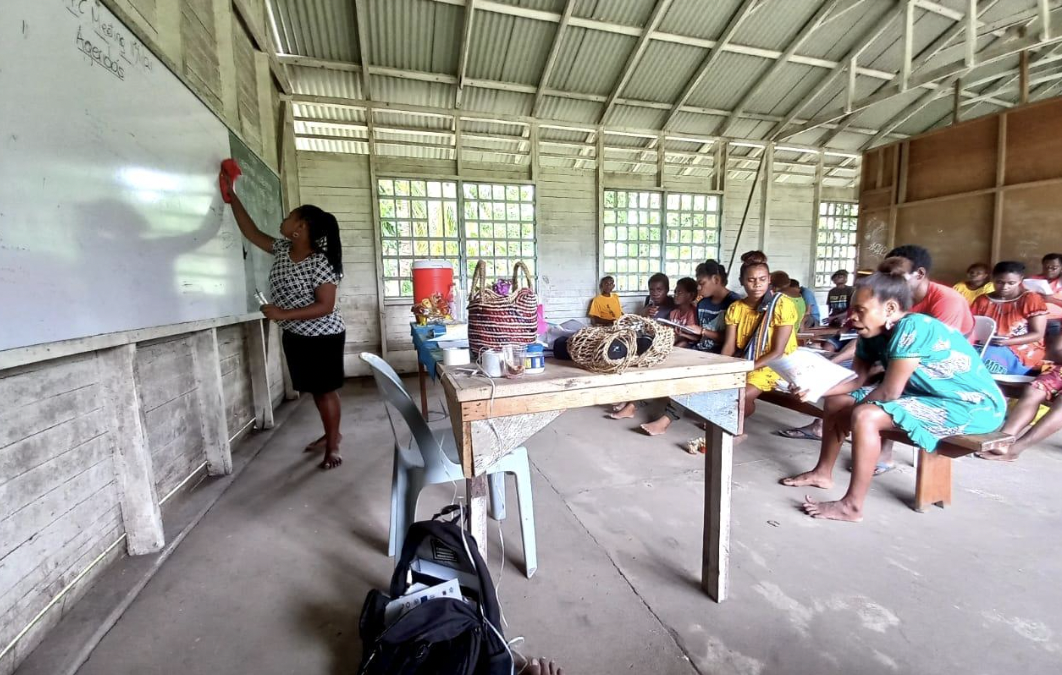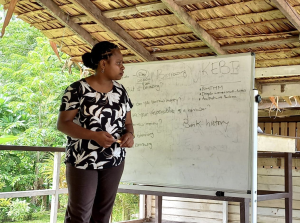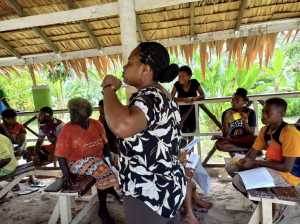
PNG: BLP Adaptation Grant, AgBook helping farming families transform their garden to business profits
Papua New Guinea’s economy relies heavily on agriculture – often referred to as the heart and backbone of the nation. In rural PNG agriculture produces all the food for subsistence and provides a base for employment and income generation for over 82% of the population.
While there are many other sectors PNG invest in, for AgBook’s Managing Director, Nicole Isifu, it is agriculture and other renewable sectors such as fisheries and tourism that should become PNG’s main drivers. The successful development of these sectors will ensure the population in PNG can sustainably participate in economic activities and improve their livelihoods over time.
To help young people and rural farmers take a more active role in agriculture (as entrepreneurs not labourers), Nicole started AgBook Agribusiness Training and Advisory Ltd. The goal being to help families and young people improve their understanding of the farm business cycle, profit and loss, cash flow and how to manage risks so they can turn their land into a profitable small business.
Farmers don’t understand the potential they have in their land to prosper. They have done the same things the same way for generations. AgBook is endeavouring to shift mindsets, to inspire farmers to consider new ideas, to assist them and co-operatives understand financial and business concepts, and to add further value through facilitating access to markets,” says Nicole.
While the COVID-19 pandemic proved difficult for AgBook to run face-to-face training courses for young farmers, it did provide the team with the opportunity to expand and adapt some of its’ services to online programs, courses and advisory sessions.
COVID-19 significantly reduced the trade of many businesses because of forced shop closures, transport restrictions, gathering restrictions etc. For AgBook, we took time to research how other training organisations dealt with the COVID-19 issues and attempted to apply some of the strategies in PNG,” says Nicole.
Through a BLP Adaptation Grant, which Nicole came across via a business network group and the BLP website, AgBook invested in online solutions such as video conferencing equipment and software to help deliver the programmes to people online.
The adaptation of the business has proven to be very successful as it allows people to take the course at their own pace and in their own time.
AgBook established the AgBook Academy, an online learning platform so that participants can undertake training at their own pace, in the comfort of their own home. However, given many rural households don’t have smart phones and computers, we are now assisting to facilitate group training so that users of the AgBook Academy can share equipment to access the online programs. Recently, we won a contract to deliver our programs to 2,000 women in Lae and will be providing downloadable access to the AgBook Academy so they can participate via written documentation,” says Nicole.
When we ask Nicole about business advice for other struggling SMES she says:
Businesses need to be aware of what’s happening around them and continually adapt to changing circumstances. They can do this by planning for things that they don’t know will happen. For example, who would have thought the world would have suffered so badly due to a 1 in a 100-year event.
In this planning, I think it is important that these businesses increase their networks and speak with as many other businesses and advisors (if possible) about the issues they face and how they are dealing with them in order to learn and adapt.”
For more information on AgBook’s training programs visit: https://www.agbooktraining.com/
ENDS
The BLP Finance Facility opened applications to Business Adaptation Grants across eight Pacific Island countries in January and June 2021. The Facility enables access to capital for stabilisation, recovery and growth of viable but financially distressed businesses in the Pacific Islands due to the impact of COVID-19 on the regional economy.
Adaptation Grants have benefitted over 200 businesses to date, and Business Link Pacific is currently processing a similar number of grants to be disbursed before the end of the year.
To further support recovery and growth, Business Link Pacific is negotiating key partnerships with Financial Institutions to offer concessionary lending to small businesses in the region and will soon make information available on accessing those products. The Finance Facility also offers curated information about financial products for businesses on its free online tool, the Finance Finder; visit today to find out what is available to your business right now.


